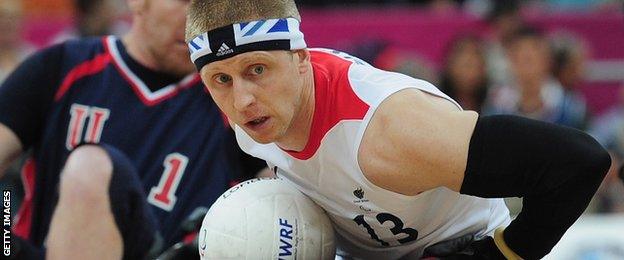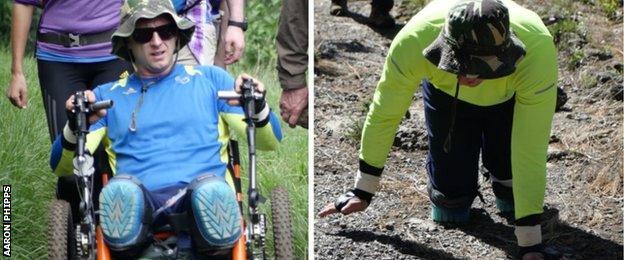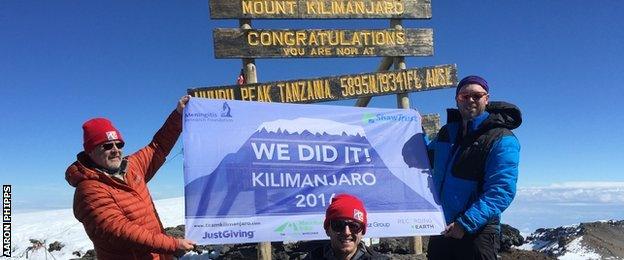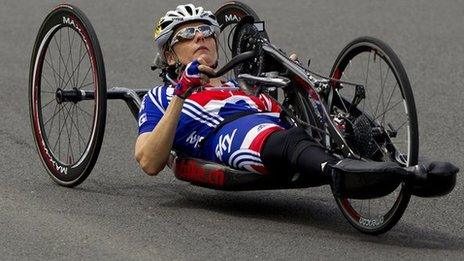Aaron Phipps: Paralympian climbs Mount Kilimanjaro 'on hands and knees'
- Published
Phipps 'crawls' to Africa's summit
Climbing nearly 6,000m to the top of Mount Kilimanjaro is a remarkable human achievement in itself. But crawling on your hands and knees for the majority of that ascent, completely unassisted, puts it on another level.
That was the feat realised by former Paralympic GB wheelchair rugby player Aaron Phipps last month, the culmination of a challenge more than three years in the making.
At London 2012, Phipps was being cheered on by the crowds at the Olympic Park as part of the "murderball" team who finished fifth.
Now, he is believed to be the first disabled person to reach Africa's summit without assistance.
Still playing wheelchair rugby and raising a young family, the 33-year-old from Totton, near Southampton, decided he needed a new challenge after the games.
"I do a lot of work for the Meningitis Research Foundation," the father of two, who lost his legs to the disease as a teenager, told BBC South Today.
"They send thousands of students to the top of Kilimanjaro every year and someone from the charity approached me asking if I fancied it.
"At the time, I didn't think: 'I'm in a wheelchair, this is going to be a problem.' Like most things in life, I just agree to things and end up in these crazy situations."
Training at home and abroad

Aaron Phipps in wheelchair rugby action for Great Britain at London 2012
And so began the journey to realise what the Solent Sharks player had agreed to.
Working alongside the biomechanics laboratory and the strength and conditioning teams at Southampton Solent University, Phipps developed a specially-adapted mountain trike.
"We geared it in a way to make sure I was going to use my major muscle groups and that hopefully I wouldn't get any injuries," he said.
"It was all about how I was going to push it most effectively."
Hours in the gym, on the treadmill and trekking through the New Forest followed, before a training climb to the top of Mont Blanc in the week prior to the real thing.
A treacherous start
With training complete and alongside a support team consisting of his 60-year-old father, fellow fundraisers and local guides, Phipps began the journey to the summit of Tanzania's iconic mountain.
"I just felt prepared when I got there, after it being three years in the making," he said.
But, right from the start, the scale of the challenge ahead hit him.
"The first 20 metres were really tough," he explained. "As I started, my chair wasn't gripping, nothing was happening.
"I had this moment where I looked at my dad and he looked at me and I'd only moved about five metres. We thought: 'Oh no, we've got a problem here.'
"But I got over the first stage and the chair held out not too bad."
'Proving a point'

Phipps had a specially-adapted mountain trike for the climb but used his hands and knees more often than not
The climb took five days in total, but Phipps' disability made the hours of each day's trek considerably longer than for able-bodied climbers.
"I don't think I underestimated it," he said. "But it was different to what I was expecting.
"I expected to use my chair a lot. But, as it got further into the challenge, it became more apparent I wasn't going to be able to use it very much.
"A moment came when the head guide said I was going to need assistance. We nearly came to blows and I said: 'No, I'm going as far as I can without any help.'
"That's when I got out of my chair and crawled on my hands and knees to prove a point."
And prove a point he did.
'In pieces' at the summit

An emotional Aaron (centre) reached the summit after a five-day trek
After a midnight start to their summit day trek, an emotional Phipps reached the peak at 5,895m around 10 hours later.
"There were definitely times when I thought 'I can't achieve this'," he recalled. "The last few steps were incredible. I was sobbing.
"I was crying anyway because I was so exhausted, but over the last few bits, I couldn't believe I'd actually made it. I was in pieces.
"For me it was all about the challenge. To be the first disabled, unassisted climb ever was a really great feeling. I felt so proud."
- Published5 September 2016
